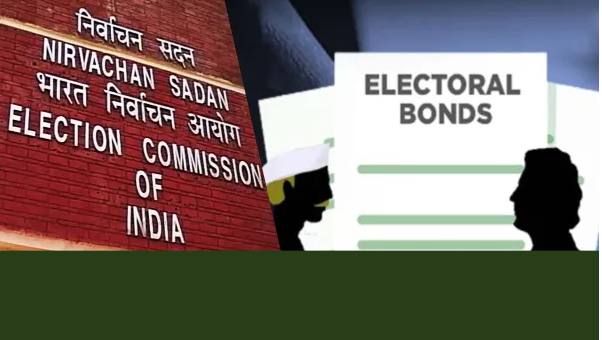Electoral bond data, BJP as the top recipient
The Election Commission recently disclosed electoral bond data, highlighting the BJP as the top recipient with Rs 6,060 crore between April 12, 2019, and January 11, 2024. Trinamool Congress and Congress followed at Rs 1,609 crore and Rs 1,421 crore, respectively. Notably, specifics on which company donated to which party were omitted.
The Commission shared two extensive lists on its website: one detailing bond purchasers and the other documenting political parties’ bond receipts. Future Gaming and Hotel Services PR emerged as the leading donor, investing Rs 1,368 crore between October 21, 2020, and January 24. This company faces legal action under the Lottery Regulation Act 1998 and the IPC.
It is not known who donated to whom
Various parties, including Congress, Trinamool Congress, AAP, SP, AIADMK, BRS, Shiv Sena, TDP, YSR Congress, DMK, JDS, NCP, JD(U), and RJD, cashed in on electoral bonds. The Supreme Court mandated the Commission to release this data by March 15, following SBI’s submission on March 12, 2024. A unique code to unveil donor-party connections was allegedly not provided, prompting ADR’s Prashant Bhushan to contemplate another Supreme Court appeal.
Congress, querying discrepancies between donor and recipient figures, emphasized 18,871 donor entries against 20,421 recipient entries. The party also questioned the data’s limited timeline, starting from April 2019 despite the bond scheme’s 2017 inception. The Commission attributed this data to SBI, revealing investments totaling Rs 16,518 crore from 1,334 entities and individuals across 27 parties between 2019 and 2024.
BJP received 5854 bonds worth Rs 1 crore each
SBI Chairman Dinesh Kumar submitted an affidavit to the Supreme Court on March 13, stating that two files on a pen drive were provided to the Election Commission of India (ECI). One file details bond purchasers, including purchase dates and amounts, while the other file outlines political parties redeeming the bonds.
Additionally, two PDF files within the envelope correspond to the pen drive and contain data on bond purchases and encashments between April 12, 2019, and February 15, 2024, with instructions on the envelope for accessing them.
SBI reported 3,346 electoral bonds purchased from April 1 to April 11, 2019, with 1,609 encashed. Between April 1, 2019, and February 15, 2024, 22,217 bonds were bought. From April 12, 2019, to February 15, 2024, a total of 18,871 bonds were purchased, with 20,421 bonds encashed in the same period.
Member of Parliament, General Secretary in-charge Communications, Indian National Congress, Jairam Ramesh has made many serious allegations against BJP and Modi government.
Jairam Ramesh write on X… Here’s a quick first analysis of the Electoral Bonds data disclosure that the SBI put up last night, after weeks of attempting to postpone it until after the election:
•Over 1,300 companies and individuals have donated electoral bonds, including over 6,000 crores to the BJP since 2019
So far, the electoral bonds data exposes at least 4 corrupt tactics of the BJP:
1)Quid Pro Quo:
There are many cases of companies that have donated electoral bonds, and immediately afterwards gotten huge benefits from the government:
a.Megha Engineering & Infra has given over Rs. 800 crores in EBs. In April 2023, they donated Rs. 140 crores, and just one month later, they were awarded the Rs. 14,400 crore Thane-Borivali Twin Tunnel Project.
b.Jindal Steel & Power gave Rs. 25 crores in EBs on 7 October 2022, and just 3 days later, they won the Gare Palma IV/6 coal mine, on 10th October 2022.
2)Hafta Vasooli:
The BJP’s Hafta Vasooli strategy is simple – raid a target through the ED/CBI/IT, and then seek hafta (“donations”) for the company’s protection. At least 14 of the top 30 donors have been raided.
a.Earlier this year an investigation found that after ED/CBI/IT raids, companies were forced to donate to the BJP via electoral trusts. Many of the same companies have donated through EBs, like Hetero Pharma and Yashoda Hospital.
b.The IT department raided Shirdi Sai Electricals in December 2023, and in January 2024, they donated Rs. 40 crores through Electoral Bonds.
c.Future Gaming & Hotels, has donated over Rs. 1200 crore, making it the largest donor in the data so far. Here is the chronology:
2nd April 2022: ED raids Future, and 5 days later (7th April) they donate Rs. 100 crores in EBs
October 2023: IT department raids Future, and the same month they donate Rs. 65 crores in EBs
3)Kickbacks
A pattern emerges from the data, where immediately after receiving some handouts from the Central government, companies have repaid the favour through electoral bonds.
a.Vedanta got the Radhikapur West private coal mine on 3rd March 2021, and then in April 2021, they donated Rs. 25 crore in Electoral Bonds.
b.Megha Engineering & Infra got the Rs. 4,500 crore Zojila tunnel project in August 2020, then donated Rs. 20 crore in Electoral Bonds in October 2020.
c.Megha got the BKC bullet train station contract in December 2022, and donated Rs. 56 crore the same month.
4)Money Laundering Through Shell Companies
One huge issue with the electoral bonds scheme is that it removed the restriction that only a small percentage of a company’s profits could be donated, paving the way for shell companies to donate black money. There are many such suspicious cases, such as the Rs. 410 crore that has been donated by Qwik Supply Chain Limited, a company whose entire share capital is just Rs. 130 crores according to MoCA filings.
Another major issue is missing data
•The data provided by SBI only begins in April 2019, but SBI sold the first tranche of bonds in March 2018. A total of Rs. 2,500 crores in bonds are missing from this data. Where is the data of these missing bonds, from March 2018 to April 2019? For instance, in the very first tranche of bonds, the BJP bagged 95% of the funds. Who is the BJP trying to protect?
As the analysis of the electoral bonds data continues, many more such cases of the BJP’s corruption will become clear. We also continue to demand unique bond ID numbers, so that we can precisely match donors to recipients.




